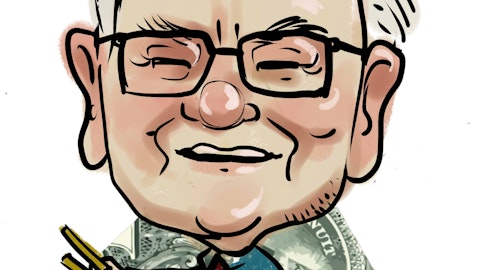
Mandel isn’t the only hedge fund manager to take an interest in Verisign, and not the only Tiger Cub either: at the end of June John Griffin’s Blue Ridge Capital reported a position of 6.2 million shares. Griffin was legendary investor Julian Robertson’s second in command before founding Blue Ridge in 1996. The fund increased its Verisign stake by 61% during the second quarter according to 13F filings (find more stock picks from Blue Ridge Capital). Philippe Laffont’s Coatue Management initiated a position of 1.3 million shares; Laffont is a Tiger Cub as well (see other stocks in Coatue’s portfolio). Point State Capital, managed by Sean Cullinan and other former portfolio managers at Stanley Druckenmiller’s Duquesne Capital, increased its own position by 74% between April and June to a total of 2.7 million shares.
The company delivered what these hedge funds were expecting when it announced its second quarter results. After failing to meet analyst expectations for two quarters in a row, Verisign grew its revenue by 13% compared to the second quarter of 2011. It also reported a $68 million gain in place of last year’s $11 million net loss. Over the first half of 2012, the company has increased its revenue by 13% and its net income by over $100 million (to $136 million). Cash flow from operations more than doubled in the first half of the year as well compared to the same period in 2011. This growth has been partly driven by an increase in domain names (up 8% for .com and .net domain names) as well as higher registration prices. On a geographic basis, revenue is up by a double-digit rate in the core U.S. market as well as in EMEA and APAC.
Verisign’s valuation multiples are high, suggesting that Mandel and other investors anticipate strong earnings growth to continue. The trailing price-to-earnings multiple is 31 with a forward P/E of 21. This seems a bit high priced to us; we can see the quantity of domain names continuing to increase in the future but are skeptical that Verisign will be able to get as much sustainable growth from pricing increases as it did in the second quarter.
As far as providing Internet infrastructure, we would look at Verisign alongside Oracle Corporation (NASDAQ:ORCL) and F5 Networks Inc (NASDAQ:FFIV). Oracle provides a number of products including database software and software development solutions (such as Java). Oracle’s low recent growth is expected by the sell-side to pick up and it trades at 11 times forward earnings estimates, though its trailing P/E is 16. Looking out further, its five-year PEG of 1 is well below Verisign’s of 1.7. F5 Networks Inc (NASDAQ:FFIV)provides networking technology for application delivery over the Internet, and has a valuation profile similar to Verisign’s: it trades at trailing and forward P/E multiples of 30 and 20, respectively. However, we would note that Verisign’s particularly high market share gives it a unique advantage over other companies in the technology sector, and perhaps it deserves a high multiple on that alone. This market share is protected by agreements with the Internet Corporation for Assigned Names and Numbers (ICANN) over many .com and .net domains for the next six years, and could certainly be renewed at that time as it was earlier this year. Therefore, the company should be able to preserve its margins as it grows safe from competition. Based on that strength we would take it over F5 Networks, and could possibly see it as being a better value than Oracle Corporation (NASDAQ:ORCL) due to the strength of Verisign’s “moat.”

